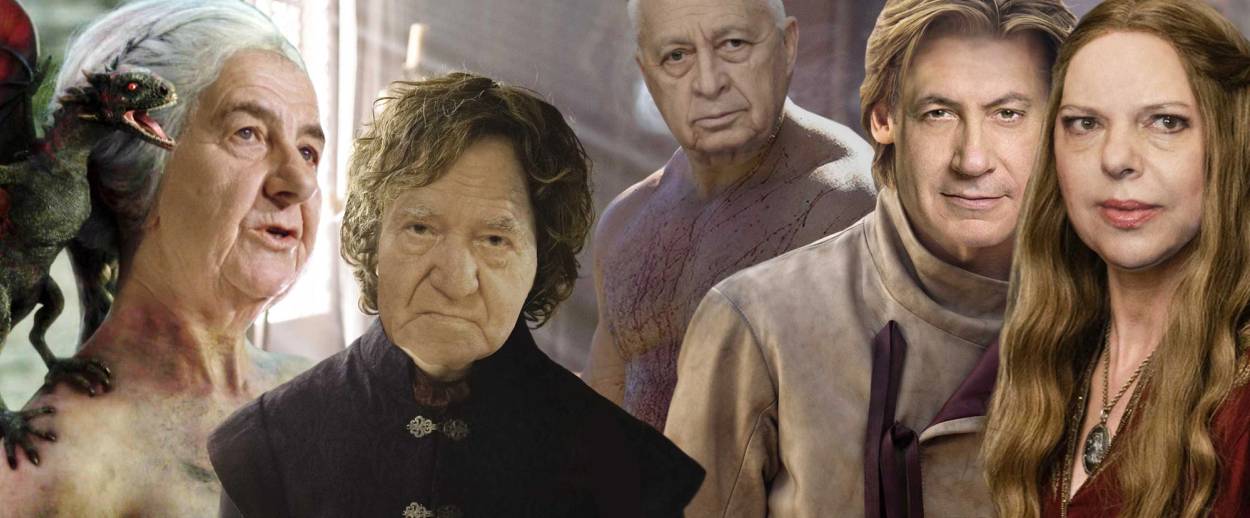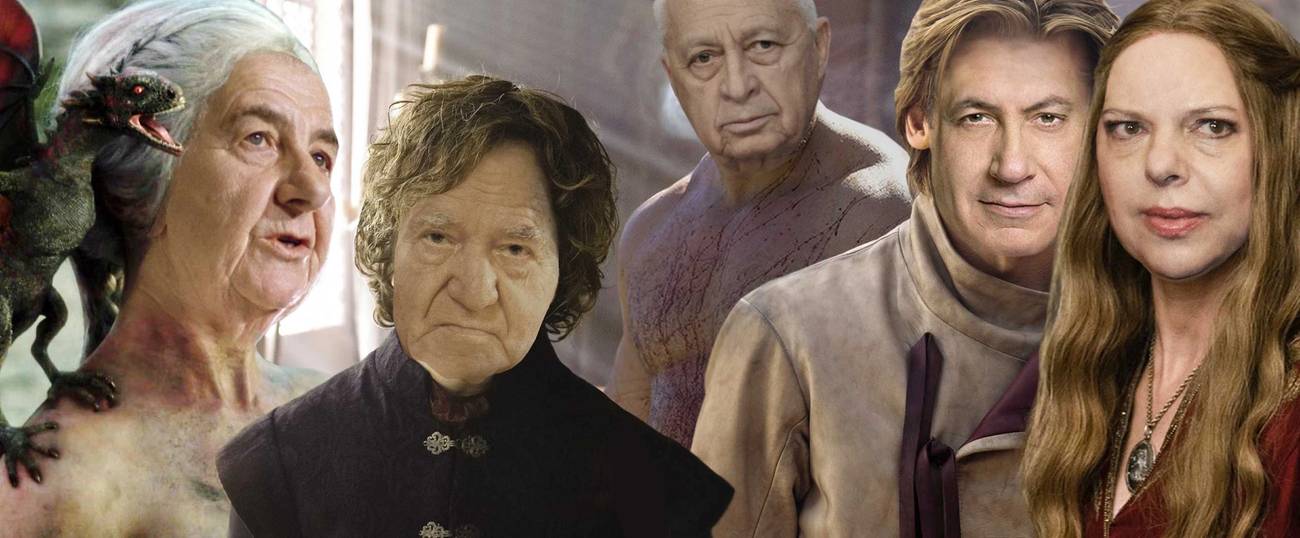‘Game of Thrones’ Author George R.R. Martin Predicts Future of Jewish State
Spoiler Alert: It isn’t pretty. And Meir Kahane plays a major role, as a character called the Hound.




“Alas, the apt phrase is not ‘open city’ but ‘open sore.’ Jerusalem bleeds as it has for almost four decades. If this city is sacred, I should hate to visit one that was profane.”
No, this sentence was not written in as a response to the current outbreak of violence between Israelis and Palestinians in Jerusalem. It actually appeared in print almost 30 years ago in a story that was part of Aces Abroad, the fourth volume of the successful Wild Cards series of science-fiction anthologies. And although describing an alternate reality, in which the history of Israel (and the world) took a different path from the one we know, the story also feels eerily prophetic. The author of the story is George R.R. Martin, better known today for the Song of Ice and Fire series of fantasy novels, adapted to the successful TV series Game of Thrones, whose sixth season starts April 24 on HBO.
The Wild Cards series grew out of role-playing sessions in which Martin and his colleagues developed a scenario about an alien “Wild Card Virus” hitting Earth shortly after the conclusion of World War II, dividing those infected into the lucky super-powered “Aces” and the outcast, physically deformed “Jokers.” Martin and his colleagues liked the scenario so much that they decided to turn it into a long-running series of “mosaic novels”—each volume containing stories written by different authors that come together into a single unfolding plot. Martin has edited each volume in the series, contributing stories and background material that brought the pieces by the different authors together.
In Aces Abroad, characters from the previous volumes—Aces and Jokers—join a delegation of the United Nation’s World Health Organization, providing them (and the readers) a panoramic view of the world in the series’ alternate vision of the 1980s. Excerpts from the journal of Xavier Desmond—mayor of the infamous “Jokertown” ghetto neighborhood in New York and founder of the “Jokers’ Anti-Defamation League”—serve as interludes between the volume’s different stories. Written by Martin in a somber style, these interludes paint a grim picture of world politics, including the politics of the Middle East.
The story of the delegation’s visit to Jerusalem opens with Desmond’s brief overview of the city’s alternate history: In the world of Wild Cards, the U.N.’s Partition Plan was successful, dividing the country into Israel and Palestine, with Jerusalem “jointly governed by commissioners from Israel, Jordan, Palestine and Great Britain.” Yet the marriage is an unhappy one, as “entire blocks resemble nothing so much as London during the Blitz, and the population that remains has grown so used to the distant sound of machine-gun fire that they scarcely seem to pay it any mind.”
Even more disturbing is the twisted mirror-image through which Martin chose to present the city’s harsh alternate-reality: In the story, the hostility between Israelis and Palestinians is not the result of the 1967 occupation, which did not happen (instead, this year in the series’ alternate reality was marked by the destruction of the Western Wall at the hands of Palestinian terrorists), but rather the result of an attempt at Israeli-Palestinian coexistence. Not only is Israel-Palestine coexistence impossible in the world of Wild Cards, the forced separation between greater Israel and Palestine is equally unsuccessful. The majority of Martin’s story is devoted to Desmond’s visit to Jerusalem’s Jokers’ Quarter, home for Joker refugees from all over the Middle East (Arab states, according to the story, do not treat their Joker citizens kindly). In the quarter Desmond meets with the Hound, a militant Joker and leader of the notorious terrorist organization known as the Twisted Fists (“illegal in both Israel and Palestine”). In their meeting, the Hound openly speculates that a war between Israel and Palestine is inevitable, claiming that the relative peace between the two states is little more than a “forty years stalemate” between “two pissed-off half-countries that share the same little desert and won’t even recognize each other.” When Desmond asks what such a war would mean for Jerusalem’s Joker community, the Hound assures him that his organization will deal effectively with hostilities, no matter which side they come from: “Every time they kill a Joker, we kill five of them.”
The Hound, the son of American-Jewish immigrants to Israel, is exclusively concerned with the interests of Jerusalem’s Joker community in a way that bears strong resemblance to Meir Kahane, the militant American rabbi who founded the racist “Kach” party and preached violence against Israel’s Arab citizens (the name of the Hound’s terrorist organization—“Twisted Fists”—brings to mind the Kach logo, featuring a raised fist within a Star of David). The Hound’s equal disdain for both Israel and Palestine is reminiscent of the fact that Kahane despised Israeli democracy every bit as much as he despised the presence of Arabs in Israel, and his prediction of an apocalyptic war between the two sides, after which “some of the wounds would start to heal” brings to mind Kahane’s apocalyptic plans for both the Jews and the Arabs of Israel.
Kahane was also disdainful of Jewish-American liberals. So, it is no surprise that the Hound mocks Desmond’s liberalism, bragging that even though the Jerusalem Jokers’ Quarter is the “second largest Joker community in the world” after Jokertown in New York (not unlike Israel, which at the time the story was written was the world’s second-largest Jewish community after that of the United States), he has many supporters within Jokertown, even within the delegation that Desmond travels with. Indeed, while claiming that he has nothing in common with the Hound and threatening to turn him in to the police, at the end of the story Desmond just cannot bring himself to do so. Sure, he opposed the Hound’s politics—but deep inside, he shares his fears.
All of this is deeply rooted within the politics of Israel in the late 1980s, but it still makes an uncomfortable reading experience for contemporary Israelis. Kahane was assassinated in 1990, and while Kach is now little more than a fringe movement made illegal in Israel, its ideology still has its appeal among many Israelis.
Toward the end of Aces Abroad, in a later excerpt from Desmond’s journal, Martin brings a bitter twist (his specialty, as any reader of his Song of Ice and Fire knows) and reveals just how the Middle East got to its bleeding status-quo in the Wild Cards universe. As it turns out, a Jewish American ace known as Envoy has used his persuasion superpowers to convince both sides to accept the U.N.’s Partition Plan in 1948. But as readers are reminded in the story, bringing true peace to the Middle East is a feat that goes beyond even the powers and good will of an American superhero. It’s a sad conclusion, which is as depressing today as it was when the story was written.
***
Like this article? Sign up for our Daily Digest to get Tablet Magazine’s new content in your inbox each morning.
Raz Greenberg, an animation researcher, is the author of Hayao Miyazaki: Exploring the Early Work of Japan’s Greatest Animator.